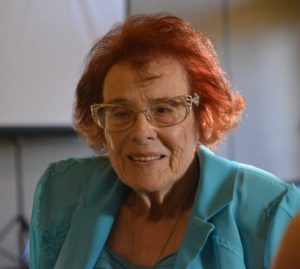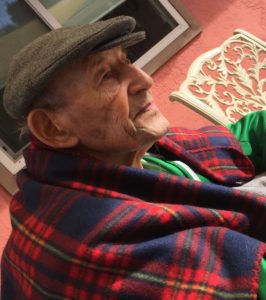Tamar Jacobs has for years recounted memories of living in Nazi Germany alongside family, friends and Jewish community members. This year she took part in Holocaust Remembrance Day while standing in front of a camera.
Sheltering at home during COVID-19 mitigation efforts in Santa Clara County, the 91-year-old Holocaust survivor was interviewed for one of many virtual Yom Hashoah events this week coordinated by Bay Area youth groups and synagogues, including the local Beth David, Beth Am and Sinai congregations.
“It’s different this year. When the audience is there and you can look at each other and say, ‘Yes, we remember what happened,’ it’s a different feeling,” Jacobs said. “On Zoom you see some faces, but you’re not together. You miss the togetherness, which is important — being a people supportive of each other and understanding.”
The International Holocaust Remembrance Day is one of many events being pushed online as the virus has spread around the world. Locally, the Diocese of San Jose held its multi-lingual Easter Masses on Facebook Live, San Jose State University plans to recognize 2020 graduates in an “online experience” in May and Apple announced its annual Worldwide Developers Conference in June will be entirely online.
But togetherness is the core of Holocaust Remembrance Day — remembering and understanding that 6 million Jews were persecuted and murdered by the Nazi regime during World War II — and the occasion was modified around the world: Virtual plaques replaced the tradition of placing messages on the Auschwitz-Birkenau train tracks; Israel’s national Holocaust museum proposed a virtual name-reading campaign; and thousands of people on Zoom stood for Israel’s nationwide Yom Hashoah memorial siren.

Jacobs recalled her mother’s stories of seeing a young Adolf Hitler in a Munich park, which her mother described by saying, ‘If looks could kill, I’d be a corpse.’ At the age of 6, Jacobs was called a “dirty Jew” and hit with rocks by a 3-year-old neighbor boy, whose parents were members of the Nazi Party. Jacobs said she was lucky to have moved away before being sent to a ghetto or camp.
These days, the decades-long San Jose resident said she is trying to stay positive and found the transition to Zoom “really simple,” and attends weekly educational classes hosted by synagogues. Referencing the work of Viktor Frankl, an Austrian psychiatrist and Holocaust survivor, Jacobs said attitude is essential to getting through any hardship.
“Even now we can choose our attitude. We can say, ‘All of this is terrible, we can’t go out,’ or we can say, ‘This is really too bad, but we have to do it. We have to save lives,’” Jacobs said. “Many people forget that and think you have no freedom, but you do have a freedom to change your attitude. Nobody can take that away from you.”
Compared to typical Yom Hashoah events that can feature hundreds of audience members and somber choir music, this year’s mix of prerecorded videos, rehearsed lines and pixelated candle vigils could seem lackluster. But Eva Rajna Lippmann, Jewish Community Relations Council chair, is trying to see this adjustment as a “COVID-lining.”
“Maybe this is pushing our community to evolve to commemorate, so we can, in fact, reach more people in more ways and more times,” said Lippman, as the 350,000 Jews in the Bay Area often contend with heavy traffic, hectic schedules and safety concerns. “I do think we’re going to get more people participating and observing in this from their home. But does that feel complete enough? Does that feel satisfying enough?”
As Yom Hashoah remembrance practices have evolved over the years, she said the switch to video may allow these first-hand testimonials to reach more Jewish community members, especially as that generation is dying out.
Lippmann’s father, Jussi Gyula Rajna, was also a Holocaust survivor. Born in 1935 in Budapest, his family lived in gold star ghettos and later successfully hid from the Nazi occupation. After her father died in late February, this year’s Holocaust Remembrance Day is of even larger significance in passing down her family’s suffering and struggles.

“I feel beyond thankful that I’m going to be 52 on Saturday and my dad died just before this COVID thing,” Lippman said. “We got to have so much time where I could ask him questions and he could tell. Now it’s more about going with my daughter and making sure that she understands and knows. When she asked me for Tuesday’s virtual Zoom link to share with her community, I was like, ‘Wow, I think she gets it.’”
While social orders to stifle the spread of COVID-19 provided organizers no alternative, Diane Fisher, Community Relations Council director at the Jewish Federation of Silicon Valley, said all of the virtual Yom Hashoah opportunities came at the perfect time.
“I think in the larger context — not just the pandemic period, but this period of challenges in our society right now — to hear this living history and to understand sort of the warnings that those experiences teach us about democracy, about standing up for one another,” Fisher said. “Those messages or are needed more than ever.”
Whether countering an increase in antisemitism like the 2018 Tree of Life Synagogue shooting, continued “us-versus-them” political rhetoric or the social distancing limitations of the coronavirus crisis, it was essential to continue offering a message of togetherness, she said.
“This is a period where we even more than normal feel we want to learn about resilience during crisis,” Fisher said. “It’s not obviously a comparable experience, but still learning how to maintain mental health, how to structure your day and practice gratitude for the health that you have and that your loved ones have is just such an important lesson.”
Follow along with San José Spotlight’s real-time coronavirus coverage on our LIVE BLOG here.
Contact Katie Lauer at [email protected] or follow @_katielauer on Twitter.



Leave a Reply
You must be logged in to post a comment.